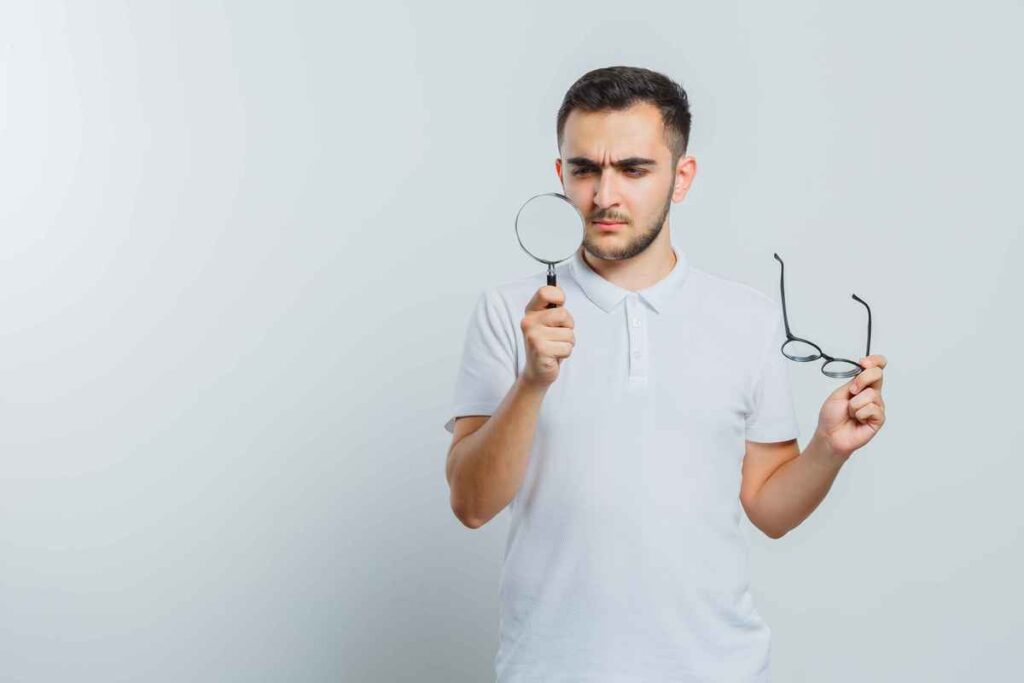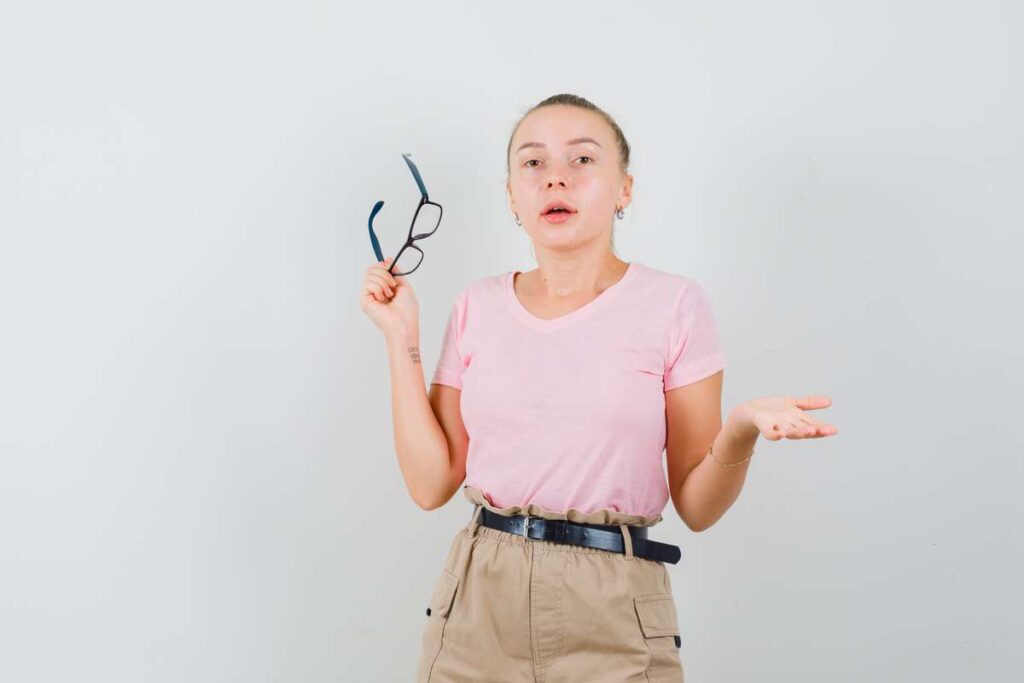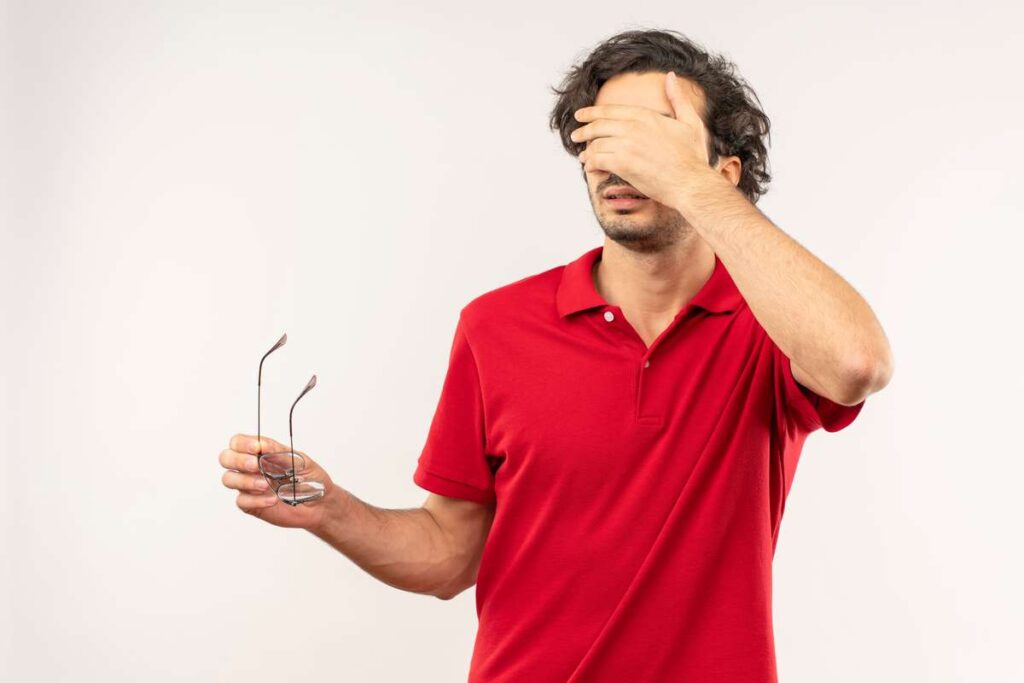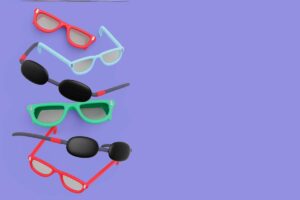Getting those new glasses feels fantastic, right? The world comes into sharp focus, and headaches from squinting become a distant memory. But you might wonder: is it necessary to wear glasses all the time?
The answer, like most things in life, isn’t a simple yes or no. It depends on several factors, including your specific vision needs and the type of glasses you have. This comprehensive guide will delve deep into the world of eyewear, helping you understand when to keep those specs on and when you can give your eyes a break.
Understanding Your Glasses: A Prescription for Clarity

Before diving into wear time, let’s explore the different types of vision problems glasses address and how they work:
- Refractive Errors: These occur when the shape of your eye prevents light from focusing correctly on the retina, resulting in blurry vision. Common refractive errors include:
- Myopia (Nearsightedness): Light focuses in front of the retina, causing blurred distance vision.
- Hyperopia (Farsightedness): Light focuses behind the retina, affecting both near and far vision (more for near vision with low hyperopia).
- Astigmatism: The cornea has an irregular shape, causing distorted vision at all distances.
- Presbyopia: A natural age-related condition where the ability to focus on near objects weakens.
- Binocular Vision Problems: These issues affect how your eyes work together. Common examples include:
- 1. Convergence Insufficiency: Difficulty focusing on near objects.
- 2. Divergence Insufficiency: Difficulty focusing on faraway objects.
Your eye doctor will diagnose your specific vision problem and prescribe glasses with corrective lenses to bend light rays and bring them into focus on your retina, resulting in sharper vision.
The Great Glasses Debate: To Wear or Not to Wear?

Now, the million-dollar question: do you need to wear your glasses all the time? Here’s a breakdown based on your prescription:
- Low Prescription: If your prescription is mild, you might only need glasses for specific activities that strain your eyes, like driving at night or reading for extended periods.
- Moderate to High Prescription: For more significant vision issues, wearing your glasses consistently throughout the day is recommended to ensure clear vision and prevent eye strain.
Here’s a helpful tip: If you find yourself squinting or experiencing headaches when not wearing your glasses, it’s a good sign you need them more often.
Is There Any Harm in Wearing Glasses All Day?
A common misconception is that wearing glasses constantly weakens your eyes. This is simply not true! Glasses simply correct your existing vision problem; they don’t alter your eye’s ability to function. In fact, wearing your glasses consistently can:
- Reduce Eye Strain: Straining to see clearly can lead to headaches, fatigue, and burning eyes. Glasses alleviate this strain by providing the necessary correction.
- Improve Overall Vision: With clear vision, you can perform daily tasks more efficiently and safely, especially activities requiring good depth perception, like driving or playing sports.
- Prevent Headaches: Eye strain is a significant contributor to headaches. Wearing your glasses as prescribed can help minimize these headaches.
Exceptions to the Rule: When to Give Your Eyes a Break

While wearing your glasses most of the time is beneficial, there are situations where taking them off might be a good idea:
- Sleeping: Glasses aren’t comfortable for sleeping and can get damaged if crushed under your head. Take them off before bed and put them in a safe place.
- Showering/Bathing: The steam can fog up your lenses, making them frustrating to use. Consider wearing contacts during these times if you have them.
- Swimming: Unless you have prescription swimming goggles, regular glasses aren’t suitable for water activities.
- Applying Eye Makeup: Taking your glasses off can provide better access to your eyelashes for mascara application or eyeliner.
Beyond Glasses: Additional Vision Correction Options
Depending on your needs and lifestyle, you might explore alternatives to traditional glasses:
- Contact Lenses: These offer a wider field of view and can be more comfortable for certain activities like sports. However, proper care and hygiene are crucial for healthy eyes.
- LASIK Surgery: This corrective eye surgery permanently reshapes the cornea to improve your vision. It’s a significant decision, so consulting a qualified ophthalmologist is essential.
Remember: Discuss your vision correction options with your eye doctor. They can help you choose the method that best suits your individual needs and preferences.
Keeping Your Vision Sharp: Eye Care Tips
- Schedule Regular Eye Exams : Ensure treatment for vision problems. Aim for an eye exam every one to two years, or as recommended by your doctor.
- Maintain a Healthy Lifestyle: Eating a balanced diet rich in fruits, vegetables, and omega-3 fatty acids can contribute to overall eye health.
- Protect Your Eyes from UV Rays: Just like your skin, your eyes need protection from the sun’s harmful UV rays. Wear sunglasses that block UVA and UVB rays.
- Practice Good Digital Hygiene: Excessive screen time can strain your eyes. Take breaks every 20 minutes, focusing on a distant object for 20 seconds (the 20-20-20 rule).
- Don’t Smoke: Smoking increases the risk of developing age-related macular degeneration and cataracts.
- Maintain a Healthy Weight: Obesity is linked to an increased risk of eye diseases like diabetic retinopathy.
- Give Your Eyes a Rest: Reduce screen time before bed and avoid straining your eyes in low light conditions.
- Blink Regularly: Blinking helps lubricate your eyes and prevent dryness.
Conclusion: A Pathway to a Clear and Comfortable Vision
By understanding your specific vision needs, the type of glasses you have, and incorporating healthy eye care practices, you can make informed decisions about when to wear your glasses. Remember, clear vision is essential for a safe and fulfilling life. Don’t hesitate to consult your eye doctor if you have any questions or concerns about your vision or your glasses.
Bonus Tip: Consider getting a spare pair of glasses to keep at work, in your car, or at a friend’s place, in case your primary pair gets lost or damaged.
Taking care of your eyes is an investment in your overall well-being. So, make sure you buy the best eyeglasses for your eyes. With proper knowledge and practices, you can enjoy a lifetime of clear and comfortable vision!





